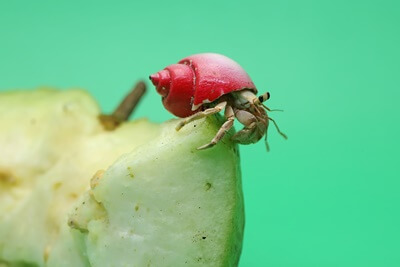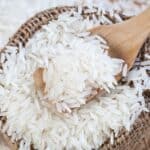Last Updated on October 19, 2023 by Joanne Harper
Hermit crabs’ feeding habits are motivated by their sense of smell and need for nutritious food.
As hermit crabs are opportunistic feeders, they lack the cognitive awareness to recognize when they’ve had enough to eat, which could result in overeating.
Hermit crabs should be given a quantity of food equivalent to their body size or less. You’ve provided the right amount if they finish their food relatively quickly and there are no leftovers.
Preventing Overeating in Hermit Crabs
Hermit crabs rely on their sense of smell to find food sources, like fruits, vegetables, fallen leaves, seeds, seaweed, animal excretions, and even animal carcasses.
One of the essential steps in preventing overeating is to regulate the food available.
Calculate serving sizes based on the number of hermit crabs and the enclosure size. Avoid offering too much food, which will result in waste and decay.
Additionally, feeding the hermit crabs is an opportunity to assess their hunger level. Keep track of how much they consume and alter the amount as necessary.

Dietary Recommendations And Health Monitoring
Pet and specialty animal stores sell food for hermit crabs. Usually, these diets give hermit crabs the nutrients they need to remain healthy. For example, calcium is necessary for a strong exoskeleton.
Verify the feeding guidelines and expiration date on the package.
You can provide fresh foods to supplement a hermit crab’s commercial diet.
Fruit pieces like apples, grapes, bananas, and strawberries are among the best examples, as are vegetables like carrots, peas, and dry seaweed sheets (nori).
Hermit crabs must consume protein in their diet. Small portions of cooked, unseasoned meat can be provided, including chicken or shrimp and tuna fish.
Removing uneaten food as soon as possible is essential if the hermit crabs aren’t finishing it within a reasonable time.
Food waste can degrade, polluting the enclosure and giving off a bad smell. The well-being of the hermit crabs depends on keeping the habitat clean, although they’re not prone to disease.
Monitor hermit crabs’ activity and appearance. Lethargy and abnormalities in their exoskeleton can be signs of overeating or other health problems. Unfortunately, treating sick hermit crabs is seldom possible.
Ensure that hermit crabs have clean, fresh water and that the humidity and temperature are appropriate. A well-kept enclosure encourages general well-being and can aid in preventing overeating.
Maintaining A Clean Habitat And Monitoring Feeding Habits
The diversity of their foraging strategies and olfactory capacities may ensure the coexistence of different species in the same habitat.
As an illustration, research has revealed that different species of marine hermit crabs, like Clibanarius digueti and Paguristes perrieri, have varied olfactory abilities that lead to variations in their foraging niches and sympatric survival in the same habitat.
To reduce competition for food resources, terrestrial hermit crab species like Coenobita clypeatus may use complementary foraging techniques with other species, including ants.
Remember that each hermit crab is different, so you might need to modify their food and feeding schedules to suit their particular preferences and requirements.
To ensure they’re thriving and aren’t underfed or overfed, routinely check their physical condition.
Despite having lower cognitive awareness than humans, hermit crabs’ distinctive behaviors influence their feeding patterns.
To preserve their health and pleasure, it’s imperative that you, as their owners, comprehend their dietary requirements and offer them a balanced diet.
We may continue to be enchanted by the antics of hermit crabs and do our part to ensure their survival for future generations with the proper care and dedication.
Hermit crabs are opportunistic creatures that consume a variety of substances, like algae, tiny dead animals, detritus, mollusks, and other organic remains found on beaches and reefs.
Their preferred feeding habits may change depending on the dietary options available to them in their surroundings. It is easy to feed a hermit crab, but giving them balanced meals is crucial.

Promoting Conservation And Responsible Pet Ownership
We can aid in the protection of hermit crabs by cooperating with passionate hobbyists, responsible pet owners, and knowledgeable veterinarians.
Let’s keep and preserve these amazing marine and land-based creatures so that future generations can enjoy their place in the web of life.
Veterinarians are crucial in informing pet owners about the scientifically validated feeding procedures for hermit crabs because they’re animal welfare advocates.
Armed with knowledge based on empirical research, they promote responsible pet keeping and guarantee the physical health of these animals.
Veterinarians understand the need to supply a suitable food and feeding plan to avoid health issues.
Additionally, vets may offer insightful information on the health indicators of hermit crabs, assisting pet owners in identifying symptoms of overeating or nutritional deficiencies.
Hermit crabs demand our attention and care due to their habits and personalities.





